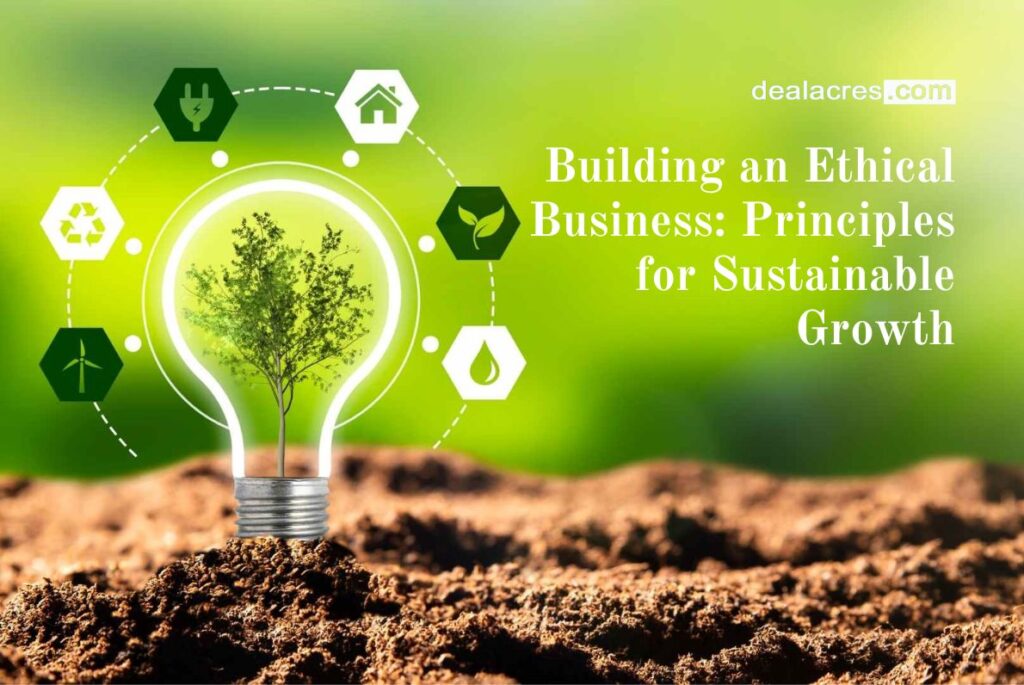Introduction
In today’s world, where concerns about climate change, social justice, and ethical practices are at the forefront, building an ethical business has become more important than ever. An ethical business not only contributes positively to society and the environment but also sets itself up for sustainable growth in the long term. In this article, we will explore the key principles that underpin ethical business practices and how they can lead to sustainable growth.

Understanding Ethical Business
Before delving into the principles, let’s first understand what an ethical business entails. An ethical business operates with integrity, transparency, and a commitment to doing what is right for people, the planet, and future generations. It goes beyond mere compliance with laws and regulations to prioritize ethical decision-making in every aspect of its operations.

Principles for Building an Ethical Business
- Integrity and Transparency: Integrity is the cornerstone of an ethical business. It means being honest, trustworthy, and accountable in all dealings, both internally and externally. Transparency goes hand in hand with integrity, as it involves being open and forthcoming about business practices, policies, and outcomes. By operating with integrity and transparency, a business earns the trust and respect of its stakeholders, including customers, employees, investors, and the community.
- Social Responsibility: A truly ethical business recognizes its responsibility to society and actively seeks to make a positive impact beyond its bottom line. This involves supporting social causes, such as education, healthcare, poverty alleviation, and diversity and inclusion initiatives. Social responsibility also extends to treating employees fairly, providing safe working conditions, and paying living wages. By prioritizing social responsibility, a business can build a strong reputation and foster goodwill among its stakeholders.
- Environmental Sustainability: In an era of climate change and environmental degradation, environmental sustainability is non-negotiable for ethical businesses. This means minimizing the environmental footprint of operations, conserving natural resources, reducing waste and pollution, and investing in renewable energy and eco-friendly practices. By embracing environmental sustainability, a business not only helps protect the planet but also reduces costs, enhances efficiency, and appeals to environmentally conscious consumers.
- Fair Labor Practices: Ethical businesses uphold fair labor practices by treating employees with dignity, respect, and fairness. This includes providing fair wages, benefits, and opportunities for advancement, as well as ensuring safe and healthy working conditions. Ethical businesses also reject exploitative practices such as child labor, forced labor, and discrimination. By prioritizing fair labor practices, a business fosters a positive work culture, enhances employee morale and productivity, and attracts top talent.
- Customer Satisfaction: Customer satisfaction is paramount for ethical businesses, as satisfied customers are more likely to become repeat customers and brand advocates. This involves delivering high-quality products or services, providing excellent customer service, listening to customer feedback, and addressing concerns promptly. Ethical businesses prioritize honesty and integrity in their marketing and sales practices, avoiding deceptive tactics or manipulative strategies. By prioritizing customer satisfaction, a business can build long-lasting relationships with its customers and drive sustainable growth through repeat business and positive word-of-mouth.
- Stakeholder Engagement: Ethical businesses recognize the importance of engaging with and listening to their stakeholders, including customers, employees, investors, suppliers, and the community. This involves seeking input and feedback, addressing concerns and grievances, and involving stakeholders in decision-making processes whenever possible. By engaging with stakeholders in a meaningful way, a business can build trust, foster collaboration, and make more informed and ethical decisions that benefit all parties involved.
- Continuous Improvement: Building an ethical business is an ongoing journey that requires a commitment to continuous improvement and learning. Ethical businesses regularly assess their practices, policies, and outcomes to identify areas for improvement and innovation. This may involve conducting ethical audits, adopting best practices, staying informed about emerging trends and issues, and adapting to changing stakeholder expectations. By embracing a culture of continuous improvement, a business can stay ahead of the curve, mitigate risks, and drive sustainable growth over the long term.

Conclusion
Building an ethical business is not only the right thing to do but also a smart business strategy for sustainable growth. By adhering to principles such as integrity, social responsibility, environmental sustainability, fair labor practices, customer satisfaction, stakeholder engagement, and continuous improvement, businesses can create value for society, the environment, and future generations while also driving long-term success and profitability. In today’s increasingly interconnected and conscious world, ethical business practices are not just an option but a necessity for businesses that aspire to thrive in the long run.




